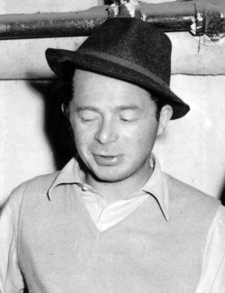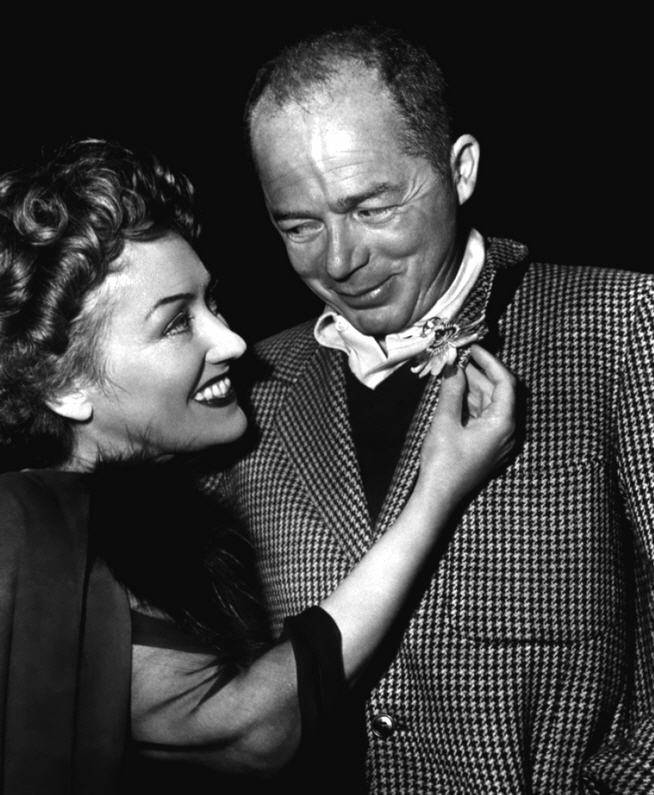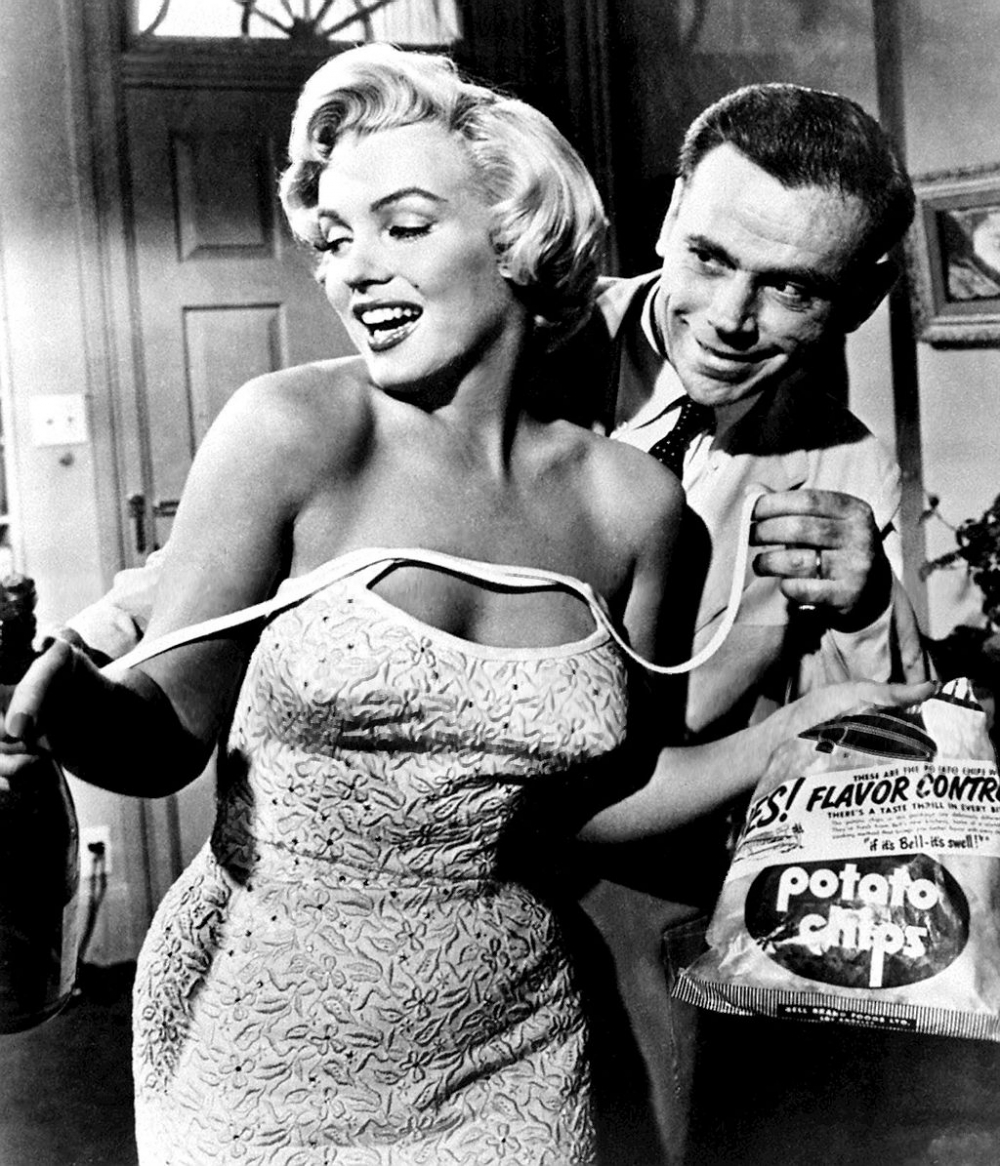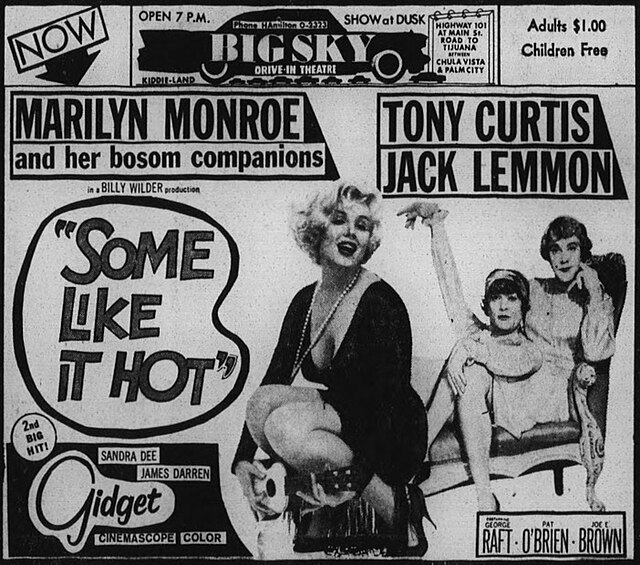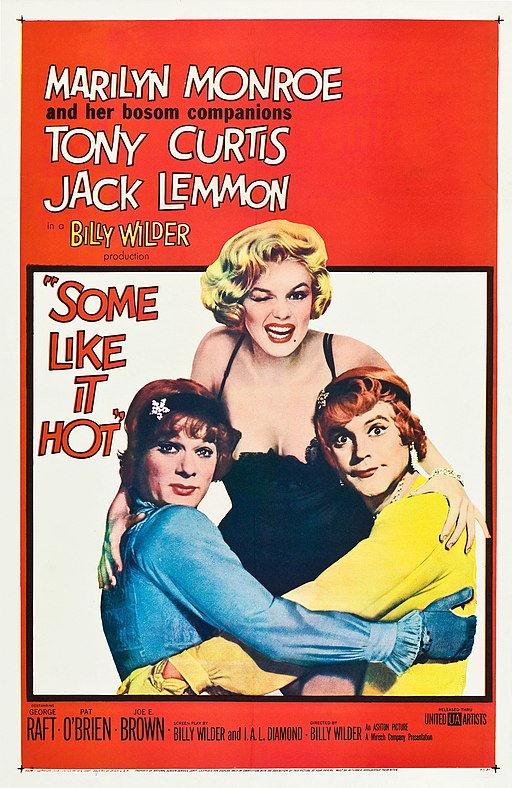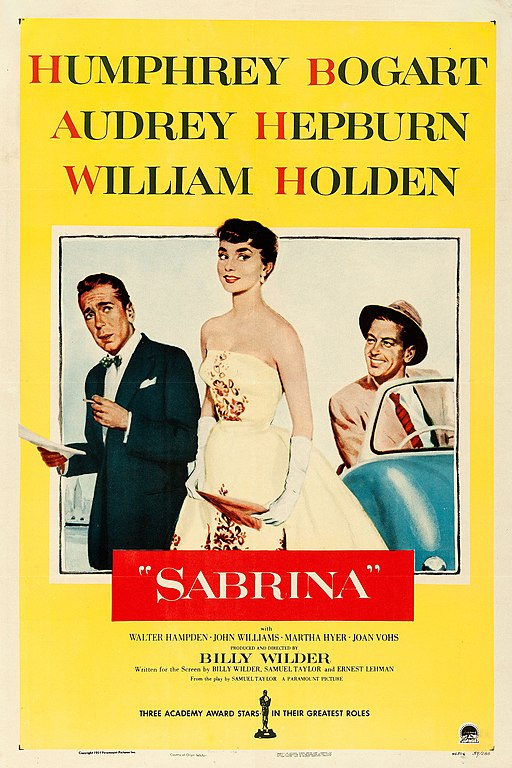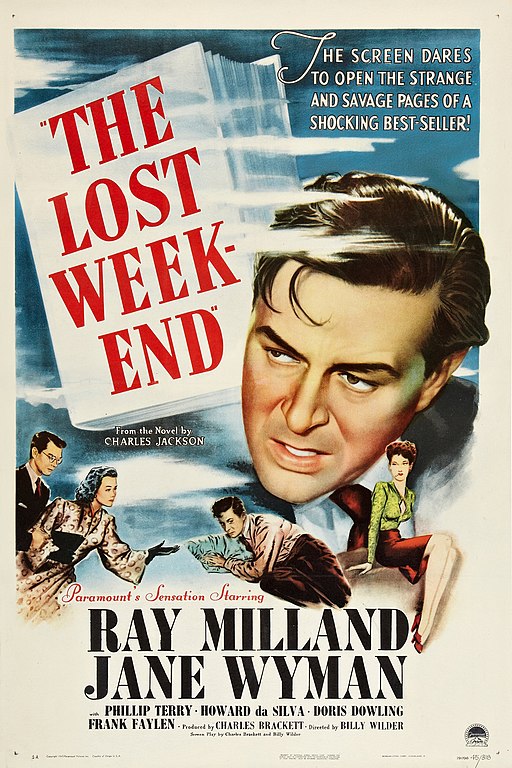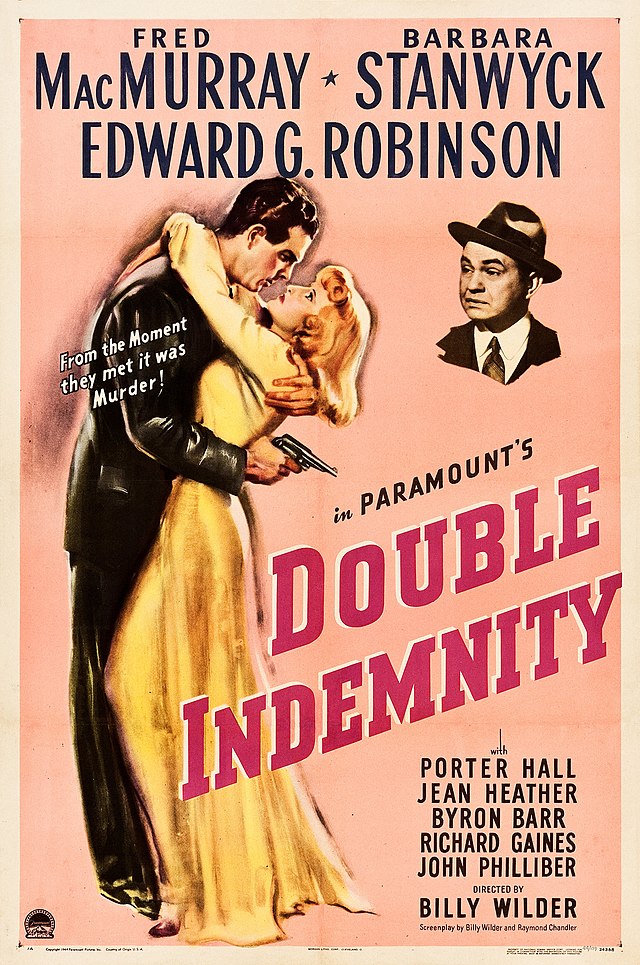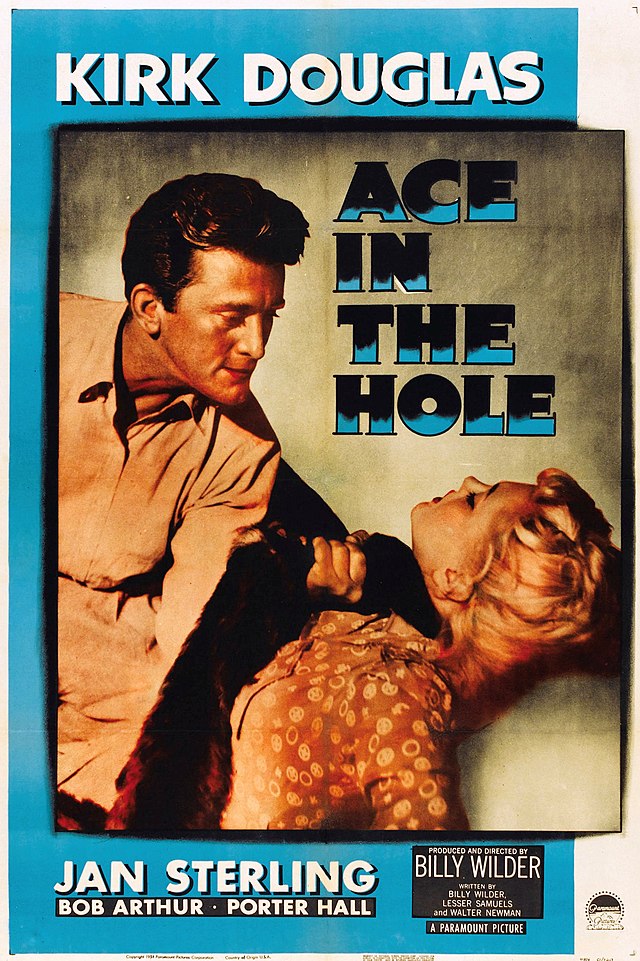Billy Wilder
back| Full Name | Samuel Wilder |
| Born | June 22, 1906 |
| Birthplace | Sucha Beskidzka, Austria-Hungary (now Poland |
| Died | March 27, 2002 |
| Buried | Westwood Village Memorial Park Cemetery in Los Angeles, California, USA |
| Married to | Judith Coppicus (1926 – 1936), Doris Blum (1939 – 1947), Audrey Young (1949 – 2002) |
| Children | Victoria Wilder (born 1939) and Vincent Wilder (born 1939, died after birth) |
| Awards | 6 Academy Awards - 4 BAFTA Awards - 5 Golden Globe Awards |
| Notable films | Double Indemnity (1944) - Sunset Boulevard (1950) - Some Like it Hot (1959) - The Apartment (1960) |
Billy Wilder - The "Viennese Pixie" of cinema
Billy Wilder (1906-2002) was a celebrated Austrian-born American filmmaker, screenwriter, producer, and journalist. Fleeing the rise of the Nazis, Wilder moved to Hollywood in the 1930s. He quickly gained recognition for his talent in both comedy and drama. His directorial career includes classics like "Double Indemnity" (1944), a pioneering film in the noir genre; "Sunset Boulevard" (1950), a trenchant critique of Hollywood; and the comedy "Some Like It Hot" (1959). Working frequently with co-writer I.A.L. Diamond, Wilder's films are known for their sharp wit, memorable characters, and often controversial subjects.
He won six Academy Awards, including Best Director for "The Apartment" (1960). Beyond his directorial achievements, Wilder's impact on cinema is underscored by his ability to tackle taboo topics with humor and grace. Despite facing challenges, like clashes with censors and changing industry dynamics, Wilder's legacy remains that of a versatile, innovative, and indomitable cinematic force. His colleagues often called him "the Viennese Pixie" for his Ausrian roots and shapr, witty nature.
Related
Billy WIlder - Complete biography and list of movies directed
Early Life
Billy Wilder was born as Samuel Wilder on June 22, 1906, in Sucha Beskidzka, which was then part of the Austro-Hungarian Empire and is now in Poland. His parents, Max Wilder and Eugenia Dittler were German-speaking jews who lived in Krakow. Father Max operated several small cafés and they happened to be in the town of Sucha where they owned a small café near the railway station. At that time mother Eugenia who always accompanied her husband gave birth to Samuel.
Billy Wilder’s mother, who had lived for six years in New York, with her uncle Reich, was enamored with the United States. That is why she nicknamed him "Billie" after Buffalo Bill.
After the first World War Billy’s parents moved to Vienna where they bought a nice apartment on Fleischmarkt number 7.
There is some discussion about whether Billy Wilder studied law at the University of Vienna or not. Fact is that he wasn’t very keen on studying law and by then he already knew that his true passion lay in storytelling, particularly through the lens of a camera. However, he began his career as a writing freelance journalist. He preferred taking interviews but most of his work involved writing sports and crime stories for several newspapers in Vienna.
Career Beginnings
Billy ventured into screenplay writing in Berlin, participating in the booming German film industry of the 1920s. His early works include the screenplay for the semi-silent, semi-talkie film "People on Sunday" (1929). However, the dark shadow of Nazism was cast over Germany, and as a Jew, Wilder's life and career were in jeopardy. However, his time in Berlin was cut short due to the rise of the Nazi Party in Germany. Being of Jewish descent, Wilder left Berlin in 1933, shortly after Adolf Hitler was appointed Chancellor of Germany. He moved to Paris and later emigrated to the United States, where he would go on to become one of Hollywood's most revered filmmakers.
Wilder’s experiences in Berlin and his escape from Nazi Germany had a profound impact on his life and work, often reflecting in the themes of his films, such as the political and dark comedic elements seen in some of his later works. His experiences in Europe, both pre and post-World War II, shaped his worldview and subsequently influenced the stories he chose to tell through his films.
Hollywood Success
The transition to Hollywood wasn’t smooth. Wilder had to overcome numerous hurdles, including language barriers and the tight competition within the industry. His initial years in Hollywood were characterized by a series of collaborations and co-writing credits, including "Ninotchka" (1939) with Greta Garbo. Here you can see the official trailer of Ninotchka: https://youtu.be/mP3GmdopSiM?si=A7pfLxurEvlrs1Gg
Wilder’s directorial debut, "The Major and the Minor" (1942), was the stepping stone that led to a series of cinematic masterpieces. He managed to shine through the studio system of Hollywood, embedding his innovative and occasionally contentious ideas into his works.
Directorial Acumen and Notable Works
Wilder’s films often explored complex characters and moral dilemmas. His film "Double Indemnity" (1944) is often cited as a paradigm of the film noir genre, exploring themes of crime, moral decay, and sexual tension.
Another notable work, "The Lost Weekend" (1945), delves into the hauntingly realistic portrayal of alcoholism, winning him Oscars for Best Picture, Director, and Screenplay.
"Billy Wilder" became synonymous with an adept ability to blend drama, romance, and dark humor. His film "Sunset Boulevard" (1950) is often regarded as one of the greatest films of American cinema, blending a tragic tale with a critical eye on Hollywood itself.
Billy Wilder and Marilyn Monroe
Billy Wilder and Marilyn Monroe worked together on two films: "The Seven Year Itch" (1955) and "Some Like It Hot" (1959). Their working relationship was a blend of success on screen and some challenges behind the scenes.
"The Seven Year Itch" (1955)
In "The Seven Year Itch," Marilyn Monroe delivered one of her most iconic performances, including the famous scene where her white dress is lifted by the breeze from a subway grate. This scene became one of the most recognizable images of her career. However, shooting this scene was quite a task, as Monroe often needed multiple takes to get her lines right, which could sometimes frustrate the crew and directors, including Wilder.
"Some Like It Hot" (1959)
"Some Like It Hot" is considered one of the greatest comedies in film history, but it also came with its share of off-screen drama. Wilder experienced challenges in directing Monroe due to her tardiness, demand for numerous retakes, and reliance on an acting coach. At this point in her career, Monroe was struggling with personal and professional issues, and her behavior on set was often unpredictable.
Professional and Personal Dynamics
Despite the difficulties, Wilder was able to extract stellar performances from Monroe, and he often spoke highly of her talent in interviews. He acknowledged that she had a unique quality that made audiences adore her and a natural comedic instinct that was rare to find. There’s a famous quote from Wilder in which he compares Monroe to a Stradivarius violin: it takes patience and careful handling, but it produces something no other instrument can. He once said, "I have an aunt in Vienna, you ask her a question, and 15 years later, she answers. This aunt can speak on the screen, be understood, and even get Academy Awards. Marilyn was not like my aunt."
Despite her difficulties on set, Monroe's performances in both films were critical in establishing them as classic comedies in Hollywood history. Her inherent vulnerability, comedic timing, and on-screen charm were invaluable, and Wilder was adept at capturing those qualities on film.
Their relationship, though sometimes strained in a professional context, was mutually respectful in terms of recognizing each other’s craft and talent. They each brought something irreplaceable to their collaborations, resulting in films that continue to be celebrated and enjoyed by generations of audiences.
The Power of Versatility
Wilder was exceptionally versatile. His romantic comedy "The Seven Year Itch" (1955) and the rom-com classic "Some Like It Hot" (1959) showcased his ability to blend humor, romance, and social commentary seamlessly.
"Some Like It Hot" also underscores Wilder's audacity as a filmmaker, challenging societal and cinematic norms by featuring themes of cross-dressing and sexuality at a time when such subjects were taboo.
Later Career of Billy WIlder
Even with the changing dynamics of the Hollywood industry, Wilder continued to create, albeit with varying degrees of success. Films like "The Apartment" (1960) continued to garner acclaim, while others were met with a lukewarm response.
Wilder’s career gradually waned during the 1960s and 1970s, as the New Hollywood era directors like Steven Spielberg and Martin Scorsese began to rise. However, his legacy was far from forgotten
Legacy
Billy Wilder passed away on March 27, 2002, at the age of 95 in Beverly Hills, California. He died of pneumonia at his home. His death marked the end of a remarkable career that spanned over five decades in the film industry, during which he became one of Hollywood's most respected and accomplished directors and screenwriters.
Wilder's impact on cinema is immeasurable. His ability to combine sharp wit, dark themes, and deeply emotional narratives left an indelible mark on Hollywood. He was a storyteller who wasn’t afraid to delve into the complex, the uncomfortable, and the morally ambiguous.
Billy Wilder passed away on March 27, 2002, leaving behind a cinematic legacy that continues to inspire filmmakers and audiences alike. His films, characterized by their narrative depth, sharp dialogue, and complex characters, are studied and celebrated for their innovation, daringness, and emotional resonance.
With six Academy Awards and numerous nominations, Wilder secured his place as one of Hollywood’s greatest directors and screenwriters. The endearing relevance of his films proves the timeless quality of his storytelling and his profound understanding of human nature and societal constructs.
Billy Wilder movies:
1942
-
"The Major and the Minor"
- Main Cast: Ginger Rogers, Ray Milland
- Description: A woman disguises herself as a 12-year-old to save money on train fare and becomes involved in a comedic misadventure when she is befriended by a kindly military officer.
1943
-
"Five Graves to Cairo"
- Main Cast: Franchot Tone, Anne Baxter
- Description: Set during WWII, an injured British corporal takes on the identity of a dead general, becoming entwined in German intelligence and a plot against Rommel.
1944
-
"Double Indemnity"
- Main Cast: Fred MacMurray, Barbara Stanwyck, Edward G. Robinson
- Description: A classic film noir in which an insurance salesman and a seductive woman conspire to murder her husband and collect the insurance money.
1945
-
"The Lost Weekend"
- Main Cast: Ray Milland, Jane Wyman
- Description: An acute examination of an alcoholic writer's lost weekend – a stark, unsparing look at the devastating effects of alcoholism.
1948
-
"The Emperor Waltz"
- Main Cast: Bing Crosby, Joan Fontaine
- Description: An American salesman travels to Austria, intending to sell gramophones but becomes entangled in romantic escapades.
-
"A Foreign Affair"
- Main Cast: Jean Arthur, Marlene Dietrich
- Description: A congressional representative travels to post-war Berlin and becomes involved with a former mistress of a German general.
1950
-
"Sunset Boulevard"
- Main Cast: William Holden, Gloria Swanson
- Description: A struggling screenwriter becomes entangled in the demented fantasy world of a faded silent-film star.
1951
-
"Ace in the Hole"
- Main Cast: Kirk Douglas, Jan Sterling
- Description: A desperate journalist exploits a man trapped in a cave to regain his former glory in the newspaper world.
1953
-
"Stalag 17"
- Main Cast: William Holden, Don Taylor
- Description: In a German POW camp, a group of American soldiers suspects that one among them is an informant.
1954
-
"Sabrina"
- Main Cast: Humphrey Bogart, Audrey Hepburn, William Holden
- Description: The daughter of a chauffeur falls for a rich playboy, despite his business-focused brother’s objections.
1955
-
"The Seven Year Itch"
- Main Cast: Marilyn Monroe, Tom Ewell
- Description: A married man battles temptation when his family goes away for the summer and a dazzling woman moves in upstairs.
1957
-
"The Spirit of St. Louis"
- Main Cast: James Stewart
- Description: A biographical drama about Charles Lindbergh, chronicling his famous non-stop flight from New York to Paris in 1927.
-
"Love in the Afternoon"
- Main Cast: Gary Cooper, Audrey Hepburn, Maurice Chevalier
- Description: A detective's daughter becomes intrigued by one of her father's cases - a notorious playboy - and decides to intervene, creating a complicated love story.
-
"Witness for the Prosecution"
- Main Cast: Tyrone Power, Marlene Dietrich, Charles Laughton
- Description: A gripping courtroom drama where an ailing barrister represents a man accused of murder, navigating through shocking revelations and turnarounds.
1959
-
"Some Like It Hot"
- Main Cast: Marilyn Monroe, Tony Curtis, Jack Lemmon
- Description: Two musicians, witnesses to a mob hit, flee the state, disguising themselves as women in an all-female band, where further comical situations ensue.
1960
-
"The Apartment"
- Main Cast: Jack Lemmon, Shirley MacLaine, Fred MacMurray
- Description: A corporate clerk allows his bosses to use his apartment for their extramarital affairs, but things complicate when he falls for one of the ladies involved.
1961
-
"One, Two, Three"
- Main Cast: James Cagney, Horst Buchholz, Pamela Tiffin
- Description: A Coca-Cola executive in West Berlin is tasked with keeping his boss’s daughter in check but encounters numerous hurdles when she marries a fierce Communist.
1963
-
"Irma la Douce"
- Main Cast: Jack Lemmon, Shirley MacLaine
- Description: A policeman falls for a Parisian prostitute and, after losing his job, disguises himself as a wealthy British lord to keep her to himself.
1964
-
"Kiss Me, Stupid"
- Main Cast: Dean Martin, Kim Novak
- Description: A struggling composer sees an opportunity to gain success through a famous singer but navigates through a series of misadventures involving his wife and a stand-in.
1966
-
"The Fortune Cookie"
- Main Cast: Jack Lemmon, Walter Matthau
- Description: A cameraman is injured during a football game and, encouraged by his brother-in-law, he exaggerates his injuries to benefit from an insurance scam.
1970
-
"The Private Life of Sherlock Holmes"
- Main Cast: Robert Stephens, Colin Blakely, Geneviève Page
- Description: An often overlooked investigation leads Holmes and Watson into a world of espionage and mystery, revealing a personal tale for Holmes.
1972
-
"Avanti!"
- Main Cast: Jack Lemmon, Juliet Mills
- Description: A businessman travels to Italy to claim the body of his father, who died while on vacation, only to discover his father had a secret romantic life and a daughter-in-law.
1974
-
"The Front Page"
- Main Cast: Jack Lemmon, Walter Matthau, Susan Sarandon
- Description: A journalist plans to escape the newsdesk and get married, but a big story breaks, pulling him back into the frenzied world of newspaper reporting.
1978
-
"Fedora"
- Main Cast: William Holden, Marthe Keller
- Description: A retired Hollywood producer seeks to coax a reclusive starlet out of retirement, but a web of mystery and deception unfolds.
1981
-
"Buddy Buddy"
- Main Cast: Jack Lemmon, Walter Matthau
- Description: A hitman finds his suicide-prone neighbor to be a significant obstacle to his job, leading to a bizarrely comedic friendship.

